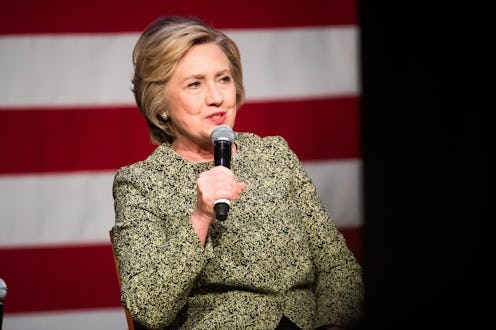News
This May Be Why Clinton Stumbles With Young Women
Hillary Clinton hopes that women will be her ticket to the White House, and if she wins the Democratic nomination, they will be a crucial voting bloc come November. But in the primary, she has seen mixed success among different groups of women. Draw the line at 50 years of age. Above 50, Clinton wins big — nearly two out of three Democratic women in that age range choose her over Sanders. Under 50, the opposite is true. And now, political scientists think they can explain why Clinton sees less support among young women.
They think it has to do with the different experiences in life that younger women and older women have had. They tested the theory by adding questions to a poll of likely voters in Massachusetts in February. They wanted to know three big things from the female respondents: if "gender-based sexism had impacted their careers/education," if "childcare responsibilities had impacted their careers/education," and if they "saw their fate linked to the fate of other women." When linking those answers to the female voters' Clinton or Sanders preference, a pretty clear picture was painted.
Experiences of gender-based discrimination and childcare holding them back differed a lot among age groups. For women under 30 — where Sanders sees the most support — less than 30 percent of women report gender-based discrimination or childcare responsibilities negatively affecting their career or education. It makes sense. Most women don't have kids in their 20s, and workers — both men and women — start their careers on largely the same footing.
As soon as women hit their 30s or 40s, though, that changes, and it change a lot. As the researchers explained, "This is the age range when women are most likely to see their careers stalled and see the highest gender-based pay inequality, especially for women with children." Women are passed up for promotions as employers worry about how maternity leave may affect the business.
Gender-based discrimination and childcare responsibilities affecting women's careers seem to be the big influencers — and discrimination especially lands people in Clinton's camp. Women of all ages who said gender-based discrimination had affected their careers or education supported Clinton by nearly a 20-point margin. Most younger women simply haven't had those same experiences — or at least haven't had them yet.
The younger women who have experienced discrimination, or who had childcare get in the way of schooling or their career, do support Clinton at the same level as older women. There just aren't very many of them — and that's a good thing. After all, gender-based discrimination is not good; any diehard Hillary supporters would agree with that.
For the the majority of young female voters, something else is likely pushing them toward Sanders. It could be their high student loan payments, or how the Great Recession has pushed the American dream of owning a house or getting married a bit further out of their reach.
It would seem that younger women, like most voters, are voting in what they see to be their best interest. Not because they don't get it, as Madeline Albright implied, and definitely not because 20-something guys are voting for Sanders, as Gloria Steinem said. There are still more factors that could be explored, and they should be. Whomever ends up being the Democratic nominee will need women on their side.
